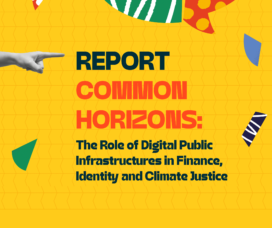Artificial Intelligence, Sustainability and the Collective Right to Access Information
There are major questions concerning the development and use of Artificial Intelligence (AI) when assessing its socio-environmental impacts throughout its entire life cycle. This discussion opens the first thematic axis of the AI with Rights project — dedicated to raising awareness about the importance of Artificial Intelligence regulation in Brazil that is centered on citizenship and rights.
Socio-environmental Challenges of Artificial Intelligence
There are major questions concerning the development and use of Artificial Intelligence (AI) when assessing its socio-environmental impacts throughout its entire life cycle. The high consumption of energy, water, and mineral resources by data centers, the extractive mining required for hardware production, the massive generation of electronic waste, and the risk of encroachment on Indigenous and Quilombola territories raise serious concerns about the socio-environmental costs of this technology.
In the technical note “Artificial intelligence (AI) end-to-end: The environmental impact of the full AI life cycle needs to be comprehensively assessed¹”, the United Nations Environment Programme (UNEP) warns of the significant socio-environmental impacts of AI across its full life cycle, particularly regarding increased energy, water, and mineral consumption to sustain its infrastructure — such as data centers and specialized hardware. It also highlights indirect and systemic effects, including greater use of autonomous vehicles, changes in consumption patterns, and the spread of misinformation about climate change.
In addition, the development and maintenance of infrastructure required for AI operations have implications for urban planning, affecting land occupation patterns and the use of natural resources, potentially compromising public supply capacity.
Precisely because of the severity of the impacts generated by such installations, transparency regarding data center activities — particularly the use of resources — is essential. Cases such as Google’s data center in Dalles, Oregon, where the company claimed such information was a trade secret, must not be repeated. Considering that tax incentive agreements were established to promote the enterprise, the duty of transparency becomes even more evident.
The Collective Right to Access Information as a Pillar for AI Sustainability
Given this context, ensuring the collective right to access public information becomes essential as a fundamental pillar for promoting socio-environmental and technological justice.
In Brazil, access to information is recognized and protected as one of the collective rights listed in Chapter I of the 1988 Federal Constitution, regulated by the Access to Information Law (LAI) and reinforced by the Brazilian General Data Protection Law (LGPD). It guarantees that individuals and organizations — including companies, social movements, and research entities — can access data of public interest, enabling social control and accountability of both public and private actors.
Like the right to personal data protection (as provided by the LGPD), access to information is a precondition for realizing other fundamental rights, such as health, education, and an ecologically balanced environment. Therefore, its effective implementation is indispensable for developing truly sustainable AI, grounded in social and climate justice, the protection of vulnerable communities, the reduction of regional inequalities, and responsible economic growth, while ensuring regulatory alignment with fundamental rights, the national legal framework, and international standards.
Given the seriousness of AI’s socio-environmental impacts, it is urgent to establish standardized methods for impact measurement and evaluation, alongside effective public policies and regulatory practices that address the mitigation of socio-environmental risks. This includes prioritizing transparent indicators on water and energy consumption, emissions, and waste disposal.
The Importance of Public and Private Transparency
The effectiveness of such policies depends on democratic governance that ensures transparency and active participation of academia, civil society, and affected communities. It is necessary to strengthen the collective right to information — as defined by the LAI, LGPD, and the Escazú Agreement — and to promote governance and data protection aligned with both national and international standards, ensuring reliability and competitiveness. Integrating these areas reinforces digital infrastructure and strengthens Brazil’s strategic position on the global stage.
Transparency, both proactive and reactive, is an essential condition for ensuring that the environmental and social impacts of AI technologies are known and auditable. This requirement should apply not only to public entities but also to private companies, especially those that receive tax incentives or operate using common natural resources, such as water.
Examples of public-interest data that should be disclosed include: energy and water consumption; carbon emissions; power purchase agreements (PPAs); environmental impact reports; waste management and disposal; and the location and urban impact of data centers.
Because these datasets are of public interest, they must be accessible to civil society, affected communities, researchers, and organizations dedicated to defending collective rights. Disclosure of this information reduces power asymmetries, strengthens social oversight, and enhances citizen participation. Furthermore, entities legally recognized to defend collective and diffuse rights have standing to request access to such information based on legitimate interest.
The absence of formal transparency requirements for companies, combined with weak mechanisms for access to information on the part of the State, undermines the ability of civil society activism and social control over initiatives that affect the public interest.
Tax Incentives and Socio-environmental Responsibility
Technological enterprises that receive tax incentives should, in return, make concrete commitments to transparency and socio-environmental responsibility. The argument that responding to information requests represents a “significant diversion of resources” must be reconsidered in light of their use of public funds and the collective impact of their operations.
Public and private investments in digital infrastructure must be tied to real guarantees of auditing, traceability, and technological effectiveness, ensuring that implemented solutions truly fulfill their sustainability and efficiency claims. Clear and publicly available environmental information enhances legal certainty for investors while allowing society to verify the real effects of these technologies. Without such mechanisms, there is a risk of tax concessions without corresponding obligations, widening regional inequalities and enabling the misuse of public resources.
To ensure investment security in the sector, adequate transparency measures are needed so that both public and private investments can be audited. Given the economic interest in Brazil’s renewable energy sources, digitalization policies, and technical capacity, there is a risk that companies may claim to follow sustainability principles without actually fulfilling them. Transparency measures create a safer investment environment by allowing verification of the effectiveness of adopted technologies, as well as their urban, social, environmental, and economic impacts in specific territories.
Conclusion: The Centrality of Transparency and Social Oversight
Strengthening the collective right to information and participatory governance is essential for the advancement of AI to occur in an ethical, just, and sustainable way. The impacts of data centers are not homogeneous: they tend to exacerbate inequalities and disproportionately affect already vulnerable populations.
Adopting transparent public policies with qualified social participation and effective control and accountability mechanisms is key to aligning AI with Brazil’s international commitments, constitutional rights, and the broader demand for a digital future that respects planetary boundaries.
Ensuring that policies are subject to public scrutiny and accountability is fundamental. The socio-environmental issues surrounding the implementation of data centers are of clear public interest — not only because of their environmental impact but also due to their effects on populations and future generations. As public resources such as water are considered common goods under Brazilian law, it is essential to establish social control mechanisms over both public actions and private activities.
¹United Nations Environment Programme. Artificial Intelligence (AI) end-to-end: The Environmental Impact of the Full AI Lifecycle Needs to be Comprehensively Assessed – Issue Note, September 2024. Available at: https://wedocs.unep.org/20.500.11822/46288
Veja também
-

Regulation Won’t Hold Back AI Innovation in Brazil
The Brazilian Chamber of Deputies has until the end of the year to deliver a final report that could shape the future of Brazilian law. Legal regulation, however, cannot be the only republican response to the explosion in the use of AI systems. Learn more about Data Privacy Brasil’s position in the article below.
-

Common Horizons: The Role of Digital Public Infrastructure in Finance, Identity and Climate Justice
In 2024, Data Privacy Brasil held the event “Common Horizons: The Role of Digital Public Infrastructure in Finance, Identity and Climate Justice". To continue the discussions held during the event, Data launched a new report with the aim of reflecting the lessons learned during the tracks promoted at the meeting.
Veja Também
DataPrivacyBr Research | Content under licensing CC BY-SA 4.0

